Unit 12Life is full of the unexpected Section B 1a-1e课件+音频(共32张ppt)人教版英语九年级全一册
文档属性
| 名称 | Unit 12Life is full of the unexpected Section B 1a-1e课件+音频(共32张ppt)人教版英语九年级全一册 |
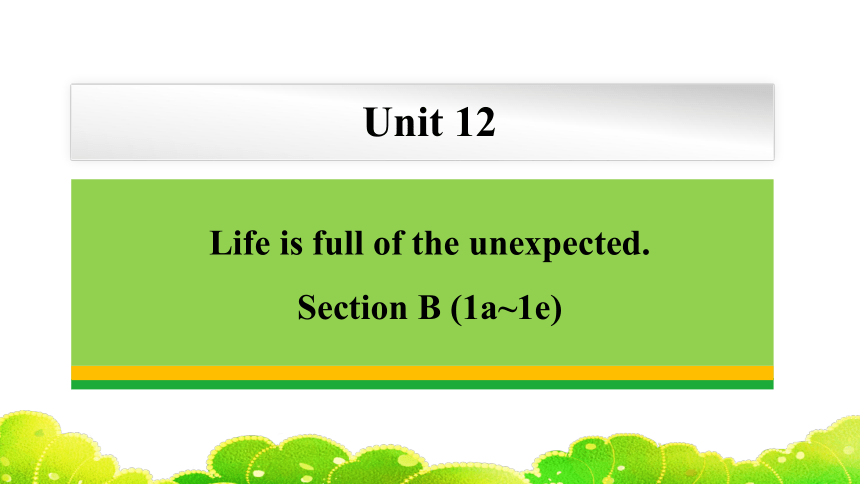
|
|
| 格式 | pptx | ||
| 文件大小 | 10.9MB | ||
| 资源类型 | 教案 | ||
| 版本资源 | 人教新目标(Go for it)版 | ||
| 科目 | 英语 | ||
| 更新时间 | 2024-01-12 21:05:24 | ||
图片预览

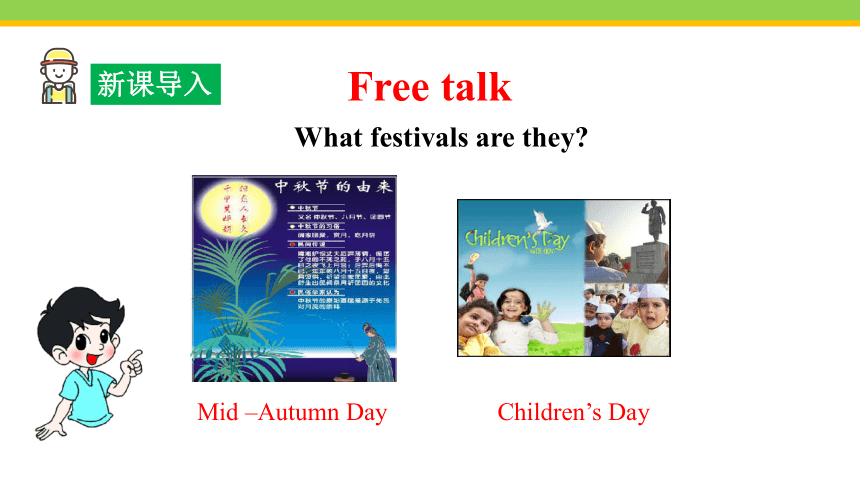
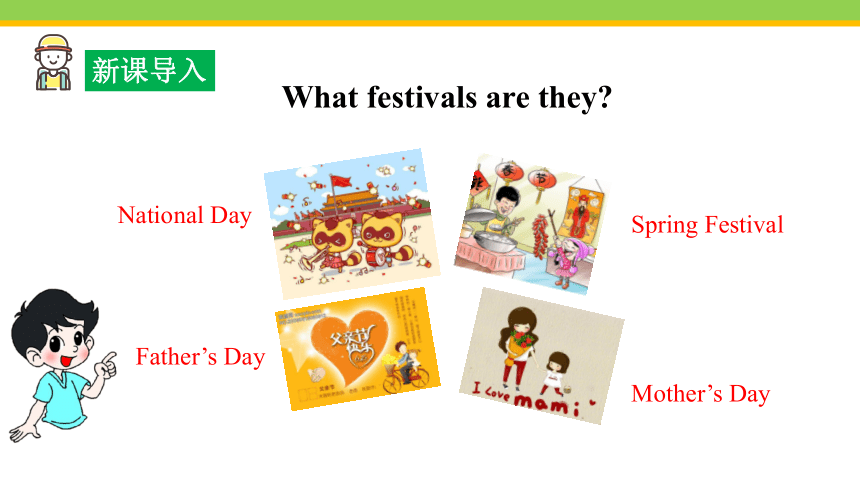
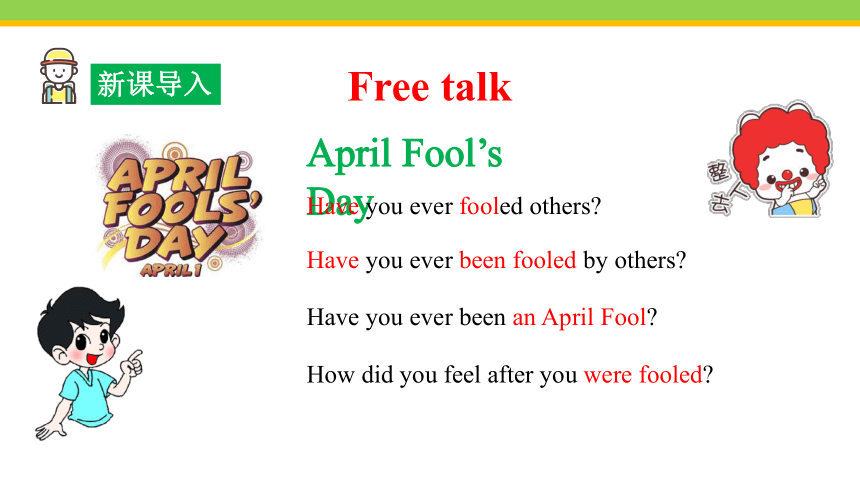
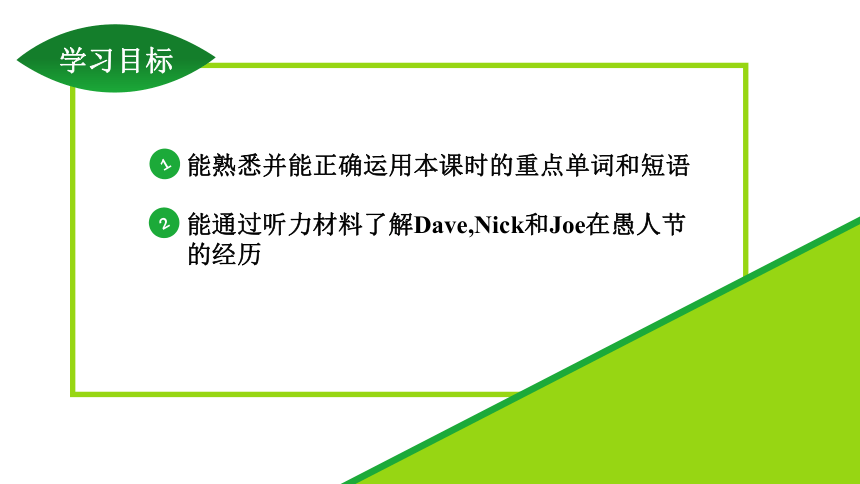
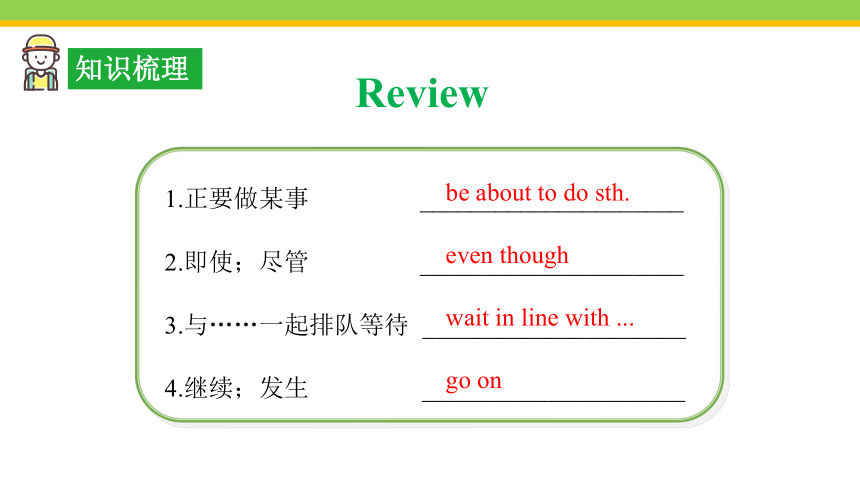
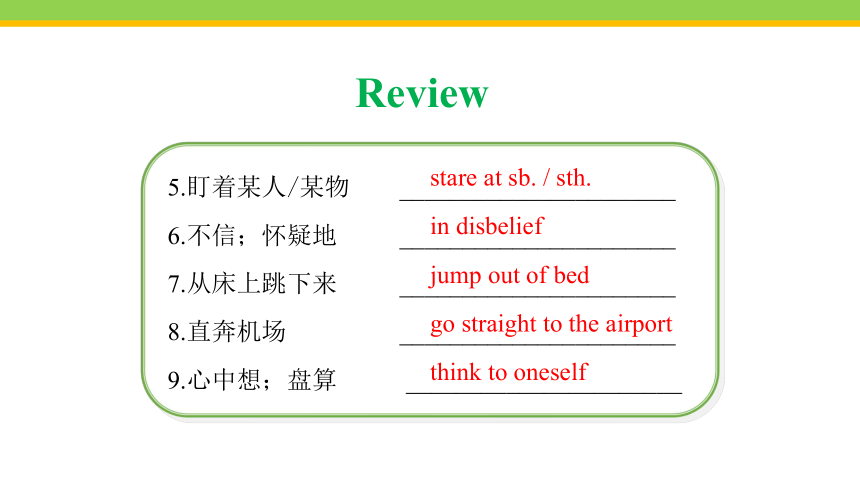
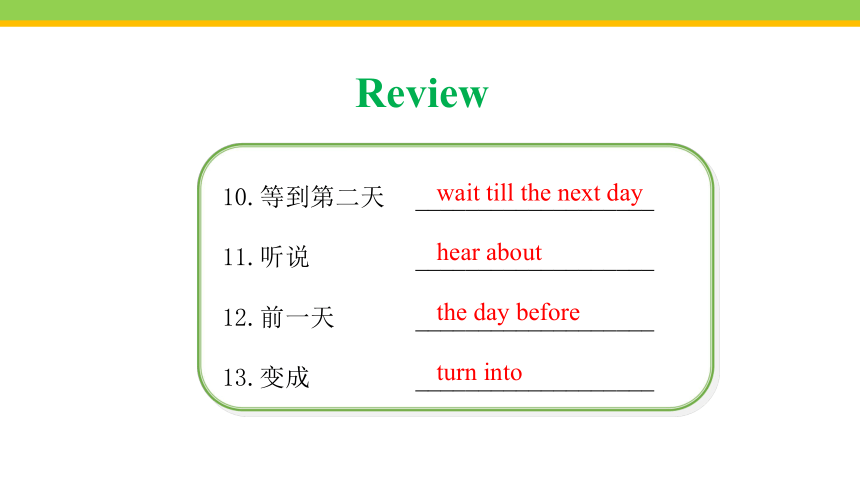
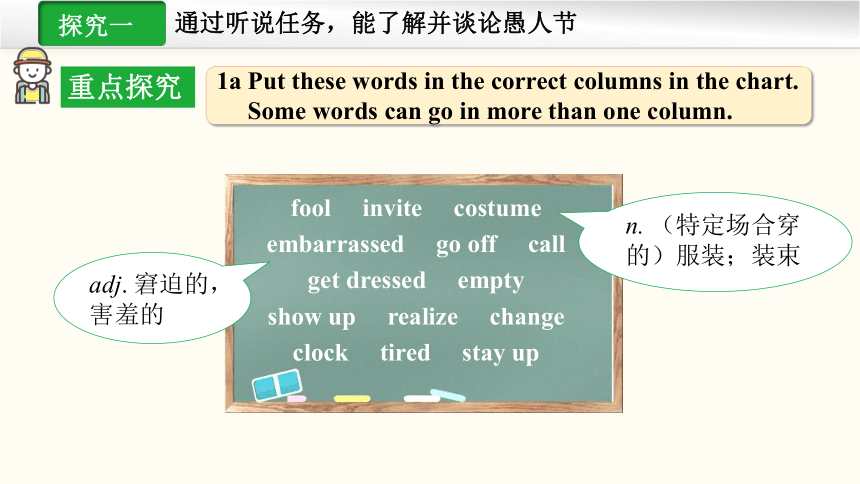
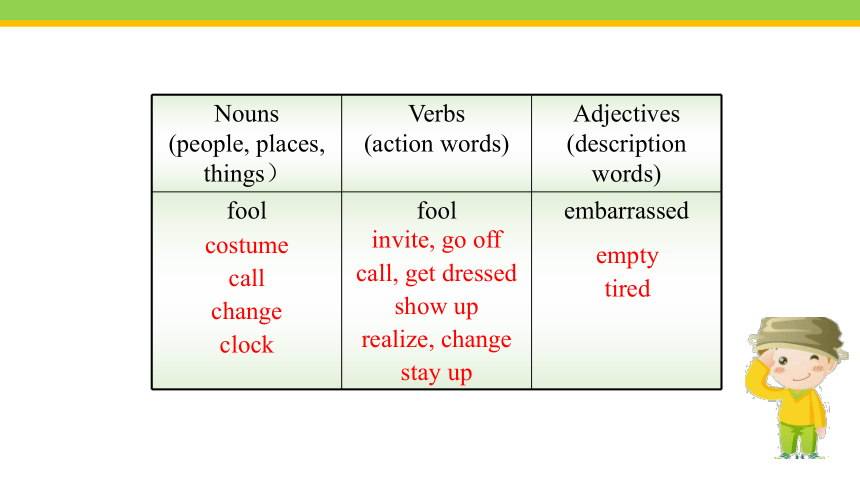
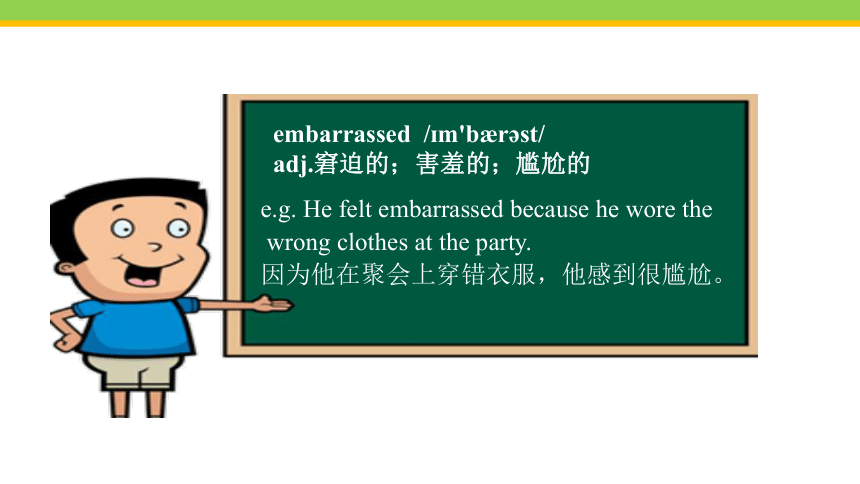
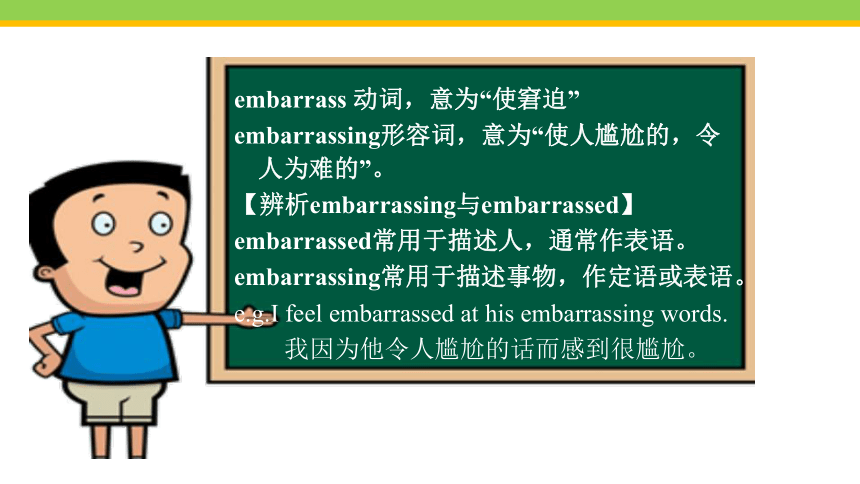
文档简介
(共32张PPT)
Unit 12
Life is full of the unexpected.
Section B (1a~1e)
新课导入
Free talk
Mid –Autumn Day
What festivals are they
Children’s Day
新课导入
National Day
Spring Festival
Father’s Day
Mother’s Day
What festivals are they
新课导入
Free talk
April Fool’s Day
Have you ever fooled others
Have you ever been fooled by others
Have you ever been an April Fool
How did you feel after you were fooled
2
1
能熟悉并能正确运用本课时的重点单词和短语
能通过听力材料了解Dave,Nick和Joe在愚人节的经历
知识梳理
Review
1.正要做某事 _____________________
2.即使;尽管 _____________________
3.与……一起排队等待 _____________________
4.继续;发生 _____________________
be about to do sth.
even though
wait in line with ...
go on
Review
5.盯着某人/某物 ______________________
6.不信;怀疑地 ______________________
7.从床上跳下来 ______________________
8.直奔机场 ______________________
9.心中想;盘算 ______________________
stare at sb. / sth.
in disbelief
jump out of bed
go straight to the airport
think to oneself
Review
10.等到第二天 ___________________
11.听说 ___________________
12.前一天 ___________________
13.变成 ___________________
wait till the next day
hear about
the day before
turn into
重点探究
通过听说任务,能了解并谈论愚人节
1a Put these words in the correct columns in the chart.
Some words can go in more than one column.
fool invite costume embarrassed go off call
get dressed empty
show up realize change clock tired stay up
adj. 窘迫的,害羞的
n. (特定场合穿的)服装;装束
Nouns (people, places, things) Verbs (action words) Adjectives
(description words)
fool fool embarrassed
invite, go off
call, get dressed
show up
realize, change
stay up
costume
call
change
clock
empty
tired
embarrassed / m'b r st/
adj.窘迫的;害羞的;尴尬的
e.g. He felt embarrassed because he wore the
wrong clothes at the party.
因为他在聚会上穿错衣服,他感到很尴尬。
embarrass 动词,意为“使窘迫”
embarrassing形容词,意为“使人尴尬的,令人为难的”。
【辨析embarrassing与embarrassed】
embarrassed常用于描述人,通常作表语。
embarrassing常用于描述事物,作定语或表语。
e.g.I feel embarrassed at his embarrassing words.
我因为他令人尴尬的话而感到很尴尬。
1b Tell your partner about something that happened to
you recently. Use two or more words in 1a.
Pair work
Last Friday night, my friend invited me to his birthday party…
Last Friday night, my friends invited me to the costume party. At 6:00 p.m., I got dressed and went off to take bus. I showed up a little late for the traffic jam. The party was really interesting and I enjoyed myself.
For example
化妆舞会
It is celebrated every year on the first day of
April. It has been popular since the 19th century.
The day is not a national holiday in any country,
but it is well known in Europe, Australia, Brazil
and the United States.
April Fools' Day
= April Fool' s Day
= All Fools' Day
On this day, people play jokes and hoaxes on each other. The jokes and their victims are known as
"April fools". Hoax stories may be reported by
the press and other media on this day and
explained later.
fool n. 傻瓜;愚人;受骗者
v.愚弄(指利用人缺乏常识,心理脆弱来欺骗人)
【常用短语】n. make a fool of... 取笑;捉弄
v. be fooled by被某人愚弄
fool的形容词形式为foolish, 意为''傻的;愚蠢的''
强调不聪明的。
e.g. Don't be a fool!别这么傻了!
He was fooled by his friend on April Fool’s Day.
愚人节那天他被他的朋友愚弄了。
Listen for the general idea听取大意
Listening task1
The main idea of the conversations is to talk about ___.
A.What happened to Dave on April Fool’s Day
B.What happened to Nick and Joe on April Fool’s Day
C. Both A and B
C
1c Dave, Nick and Joe are talking about April Fool’s Day. Listen and write each person’s name under the correct picture.
Joe
Nick
Dave
Listening task2
1d Listen again. Who says each of the phrases below
Write D for Dave, N for Nick and J for Joe.
1. _____ a costume party
2. _____ my alarm went off
3. _____ stayed up all night
D
N
J
4. _____ was tired
5. _____ was really embarrassed
6. _____ the other kids showed up
D
N
J
Listening task3
Listen again and check the sentences with T or F.
Dave hasn’t been tricked on April Fool’s Day.
Nick was tricked by his friend by inviting him to a costume party.
Nick fooled his brother by changing the clock earlier.
Joe’s friend called him and told him to prepare for a math test.
F
F
F
T
Listening task4
Answer the questions.
Listening task5
What’s the funny thing about Dave
Why did Nick go to school earlier
What did Joe do when he knew the test
Did Joe get a good mark in that test
He was the only person wearing a costume in the “party”, for his friends tricked him.
His clock had been changed by his brother to an hour earlier.
He stayed up all night studying and was tired.
We don’t know, for there is no test at all.
Role-play the conversation.
Nick: Has someone ever tricked you on April Fool’s Day, Dave
Dave: Yes. A friend once invited me to a costume party. When I got there, I found that it wasn’t a costume party. I was the only person wearing a costume, and I was really embarrassed. How about you, Nick
Nick: Well, last April Fool’s Day, when my alarm went off, I got up, took a shower, got dressed, and went to school. But when I got there, the school was
Tape script
empty. I was the only one there. After an hour, the other kids showed up, and I realized that my brother had fooled me.
Dave: He had
Nick: Uh-huh. He had changed the clock to an hour earlier.What about you, Joe What happened to you on April Fool’s Day
Joe: Well, my friend called me on March 31st last year and told me we had a math test the next day. By the time I got to math class, I was tired because I had stayed up all night studying. Then I found out that my friend had fooled me.
We didn’t have a test at all!
1e Tell April Fool’s Day stories in your group.
Use the information in 1c and 1d.
Joe
Nick
Dave
What happened to Dave on April Fool’s Day
Well, a friend invited him to a costume party …
What happened to Dave on April Fool’s Day
在愚人节那天,戴夫发生了什么事?
happen是不及物动词,没有被动语态。
What’s happened = What has happened
已经发生了什么事?
【拓展】
(1) sth.+ happen +时间/地点,意为“某时/某地发生了某事”。
An accident happened in our neighborhood just now.
刚刚我家附近发生了一起事故。
(2) sth.+ happen to sb.意为“某人发生了某事”。
A car accident happened to Jim yesterday.
吉姆昨天发生了一起车祸。
(3) sb.+ happen to do sth.意为“某人碰巧做某事”。
I happened to hear that interesting story.
我碰巧听到了那个有趣的故事。
What happened to you on April Fool’s Day
Where did you go
Who did you go with / Who did it
What did you do / What did you realize
How did you feel
When Where Who What How
Group work
小组展示
1 组
2 组
3 组
4 组
活动小结
通过以上的活动,我们完成了听说任务,了解了愚人节的来源与习俗,并可以掌握一些新单词与句型:
embarrassed意为_______________________;fool作名词时是指____________________,作动词时意为_________;
还有含有happen的句型:(1)_________________________;
(2)____________________(3)______________________。
窘迫的;害羞的;尴尬的
傻瓜;愚人;受骗者
愚弄
sth.+ happen +时间/地点
sth.+ happen to sb.
sb.+ happen to do sth.
当堂检测
根据提示完成句子。
1.Do you know where John is He was going to meet me earlier but
he didn’t _______(露面).
2.My cousin is only two years old and she can't __________
(穿衣服) by herself.
3.Last week, my father was so busy that he _________(熬夜)
several nights.
4.I got up and dressed myself quickly when my alarm clock
_________(发出响声).
5.Can you come to my ___________(化装舞会)tomorrow evening
show up
get dressed
stayed up
went off
costume party
课堂总结
重要单词/短语:
fool n. 傻瓜;愚人;受骗者
vt. 愚弄,欺骗
make a fool of … 取笑embarrassed adj. 局促不安的;为难的;尴尬的
embarrassing adj. 使人尴尬的,令人为难的
重要句型:
What’s happened = What has happened
(1) sth.+ happen +时间/地点
(2) sth.+ happen to sb.
(3) sb.+ happen to do sth.
Unit 12 Section B (1a~1e)
Unit 12
Life is full of the unexpected.
Section B (1a~1e)
新课导入
Free talk
Mid –Autumn Day
What festivals are they
Children’s Day
新课导入
National Day
Spring Festival
Father’s Day
Mother’s Day
What festivals are they
新课导入
Free talk
April Fool’s Day
Have you ever fooled others
Have you ever been fooled by others
Have you ever been an April Fool
How did you feel after you were fooled
2
1
能熟悉并能正确运用本课时的重点单词和短语
能通过听力材料了解Dave,Nick和Joe在愚人节的经历
知识梳理
Review
1.正要做某事 _____________________
2.即使;尽管 _____________________
3.与……一起排队等待 _____________________
4.继续;发生 _____________________
be about to do sth.
even though
wait in line with ...
go on
Review
5.盯着某人/某物 ______________________
6.不信;怀疑地 ______________________
7.从床上跳下来 ______________________
8.直奔机场 ______________________
9.心中想;盘算 ______________________
stare at sb. / sth.
in disbelief
jump out of bed
go straight to the airport
think to oneself
Review
10.等到第二天 ___________________
11.听说 ___________________
12.前一天 ___________________
13.变成 ___________________
wait till the next day
hear about
the day before
turn into
重点探究
通过听说任务,能了解并谈论愚人节
1a Put these words in the correct columns in the chart.
Some words can go in more than one column.
fool invite costume embarrassed go off call
get dressed empty
show up realize change clock tired stay up
adj. 窘迫的,害羞的
n. (特定场合穿的)服装;装束
Nouns (people, places, things) Verbs (action words) Adjectives
(description words)
fool fool embarrassed
invite, go off
call, get dressed
show up
realize, change
stay up
costume
call
change
clock
empty
tired
embarrassed / m'b r st/
adj.窘迫的;害羞的;尴尬的
e.g. He felt embarrassed because he wore the
wrong clothes at the party.
因为他在聚会上穿错衣服,他感到很尴尬。
embarrass 动词,意为“使窘迫”
embarrassing形容词,意为“使人尴尬的,令人为难的”。
【辨析embarrassing与embarrassed】
embarrassed常用于描述人,通常作表语。
embarrassing常用于描述事物,作定语或表语。
e.g.I feel embarrassed at his embarrassing words.
我因为他令人尴尬的话而感到很尴尬。
1b Tell your partner about something that happened to
you recently. Use two or more words in 1a.
Pair work
Last Friday night, my friend invited me to his birthday party…
Last Friday night, my friends invited me to the costume party. At 6:00 p.m., I got dressed and went off to take bus. I showed up a little late for the traffic jam. The party was really interesting and I enjoyed myself.
For example
化妆舞会
It is celebrated every year on the first day of
April. It has been popular since the 19th century.
The day is not a national holiday in any country,
but it is well known in Europe, Australia, Brazil
and the United States.
April Fools' Day
= April Fool' s Day
= All Fools' Day
On this day, people play jokes and hoaxes on each other. The jokes and their victims are known as
"April fools". Hoax stories may be reported by
the press and other media on this day and
explained later.
fool n. 傻瓜;愚人;受骗者
v.愚弄(指利用人缺乏常识,心理脆弱来欺骗人)
【常用短语】n. make a fool of... 取笑;捉弄
v. be fooled by被某人愚弄
fool的形容词形式为foolish, 意为''傻的;愚蠢的''
强调不聪明的。
e.g. Don't be a fool!别这么傻了!
He was fooled by his friend on April Fool’s Day.
愚人节那天他被他的朋友愚弄了。
Listen for the general idea听取大意
Listening task1
The main idea of the conversations is to talk about ___.
A.What happened to Dave on April Fool’s Day
B.What happened to Nick and Joe on April Fool’s Day
C. Both A and B
C
1c Dave, Nick and Joe are talking about April Fool’s Day. Listen and write each person’s name under the correct picture.
Joe
Nick
Dave
Listening task2
1d Listen again. Who says each of the phrases below
Write D for Dave, N for Nick and J for Joe.
1. _____ a costume party
2. _____ my alarm went off
3. _____ stayed up all night
D
N
J
4. _____ was tired
5. _____ was really embarrassed
6. _____ the other kids showed up
D
N
J
Listening task3
Listen again and check the sentences with T or F.
Dave hasn’t been tricked on April Fool’s Day.
Nick was tricked by his friend by inviting him to a costume party.
Nick fooled his brother by changing the clock earlier.
Joe’s friend called him and told him to prepare for a math test.
F
F
F
T
Listening task4
Answer the questions.
Listening task5
What’s the funny thing about Dave
Why did Nick go to school earlier
What did Joe do when he knew the test
Did Joe get a good mark in that test
He was the only person wearing a costume in the “party”, for his friends tricked him.
His clock had been changed by his brother to an hour earlier.
He stayed up all night studying and was tired.
We don’t know, for there is no test at all.
Role-play the conversation.
Nick: Has someone ever tricked you on April Fool’s Day, Dave
Dave: Yes. A friend once invited me to a costume party. When I got there, I found that it wasn’t a costume party. I was the only person wearing a costume, and I was really embarrassed. How about you, Nick
Nick: Well, last April Fool’s Day, when my alarm went off, I got up, took a shower, got dressed, and went to school. But when I got there, the school was
Tape script
empty. I was the only one there. After an hour, the other kids showed up, and I realized that my brother had fooled me.
Dave: He had
Nick: Uh-huh. He had changed the clock to an hour earlier.What about you, Joe What happened to you on April Fool’s Day
Joe: Well, my friend called me on March 31st last year and told me we had a math test the next day. By the time I got to math class, I was tired because I had stayed up all night studying. Then I found out that my friend had fooled me.
We didn’t have a test at all!
1e Tell April Fool’s Day stories in your group.
Use the information in 1c and 1d.
Joe
Nick
Dave
What happened to Dave on April Fool’s Day
Well, a friend invited him to a costume party …
What happened to Dave on April Fool’s Day
在愚人节那天,戴夫发生了什么事?
happen是不及物动词,没有被动语态。
What’s happened = What has happened
已经发生了什么事?
【拓展】
(1) sth.+ happen +时间/地点,意为“某时/某地发生了某事”。
An accident happened in our neighborhood just now.
刚刚我家附近发生了一起事故。
(2) sth.+ happen to sb.意为“某人发生了某事”。
A car accident happened to Jim yesterday.
吉姆昨天发生了一起车祸。
(3) sb.+ happen to do sth.意为“某人碰巧做某事”。
I happened to hear that interesting story.
我碰巧听到了那个有趣的故事。
What happened to you on April Fool’s Day
Where did you go
Who did you go with / Who did it
What did you do / What did you realize
How did you feel
When Where Who What How
Group work
小组展示
1 组
2 组
3 组
4 组
活动小结
通过以上的活动,我们完成了听说任务,了解了愚人节的来源与习俗,并可以掌握一些新单词与句型:
embarrassed意为_______________________;fool作名词时是指____________________,作动词时意为_________;
还有含有happen的句型:(1)_________________________;
(2)____________________(3)______________________。
窘迫的;害羞的;尴尬的
傻瓜;愚人;受骗者
愚弄
sth.+ happen +时间/地点
sth.+ happen to sb.
sb.+ happen to do sth.
当堂检测
根据提示完成句子。
1.Do you know where John is He was going to meet me earlier but
he didn’t _______(露面).
2.My cousin is only two years old and she can't __________
(穿衣服) by herself.
3.Last week, my father was so busy that he _________(熬夜)
several nights.
4.I got up and dressed myself quickly when my alarm clock
_________(发出响声).
5.Can you come to my ___________(化装舞会)tomorrow evening
show up
get dressed
stayed up
went off
costume party
课堂总结
重要单词/短语:
fool n. 傻瓜;愚人;受骗者
vt. 愚弄,欺骗
make a fool of … 取笑embarrassed adj. 局促不安的;为难的;尴尬的
embarrassing adj. 使人尴尬的,令人为难的
重要句型:
What’s happened = What has happened
(1) sth.+ happen +时间/地点
(2) sth.+ happen to sb.
(3) sb.+ happen to do sth.
Unit 12 Section B (1a~1e)
同课章节目录
- Unit 1 How can we become good learners.
- Section A
- Section B
- Unit 2 I think that mooncakes are delicious!
- Section A
- Section B
- Unit 3 Could you please tell me where the restroom
- Section A
- Section B
- Unit 4 I used to be afraid of the dark.
- Section A
- Section B
- Unit 5 What are the shirts made of?
- Section A
- Section B
- Review of Units 1-5
- Unit 6 When was it invented?
- Section A
- Section B
- Unit 7 Teenagers should be allowed to choose their
- Section A
- Section B
- Unit 8 It must belong to Carla.
- Section A
- Section B
- Unit 9 I like music that I can dance to.
- Section A
- Section B
- Unit 10 You're supposed to shake hands.
- Section A
- Section B
- Review of Units 6-10
- Unit 11 Sad movies make me cry.
- Section A
- Section B
- Unit 12 Life is full of the unexpected
- Section A
- Section B
- Unit 13 We're trying to save the earth!
- Section A
- Section B
- Unit 14 I remember meeting all of you in Grade 7.
- Section A
- Section B
- Review of Units 11-14
